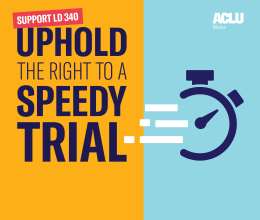Last week, I watched a short film by The House I Live In director Eugene Jarecki titled Just Say No …to the War on Drugs. In the 2 minute and 30 second film, Jarecki lays out the failure of the War on Drugs, its enormous costs – both fiscal cost to taxpayers and human cost to our communities, and its ultimate failure to curb and deter drug abuse whatsoever.
As we have blogged about before, drug abuse is first and foremost a public heath issue. Addiction is a disease requiring treatment. Opiate addiction, particularly, can alter the chemicals in a person’s brain, making overcoming addiction a life-long challenge.
However, here in Maine, rather than focus our scarce resources to help those suffering from addiction get the support they need, we have continued to focus on enforcement and punishment. In our state, mere possession of any quantity of an opioid or opioid derivative (including heroin, oxycontin or hydrocodone) is a felony – punishable by up to five years in prison. This is an extraordinarily harsh penalty, as even under federal law a first offense for possession is a misdemeanor.
We now have more people in our state prisons serving time for drug law violations than for any other crime. Yet despite this focus on punishment (particularly for those suffering from opioid addition), drug abuse rates have continued to rise across our state. In fact, just yesterday, Maine Attorney General Janet Mills reported that in 2013 Maine again saw a rise in drug related deaths, as 176 Mainers tragically passed away of accidental overdoses.
Clearly it is time for a new approach. While we have focused on ramping up enforcement of drug laws, funding for treatment has consistently been cut. Residential treatment facilities in Maine continue to have long waitlists, with just under 200 beds available across our state (over 4,800 people in Maine sought treatment last year for opiates alone).
And while we consistently hear from the Maine Department of Public Safety and the Maine Drug Enforcement Agency that they are only interested in “the big time dealers coming in from out of state,” almost 80% of drug arrests in Maine are for possession alone. Now, hundreds of Mainers are not only facing the challenge of overcoming their addiction, but the additional burden of a felony conviction and the collateral consequences that accompany it.
There is no question that Maine’s tragic rise in drug abuse rates is cause for concern. However, with over 40 years of failed drug war policy, it is clear it is time for a new approach. Rather than prioritize mechanisms to punish people for their disease, we need to invest in ways to support people suffering from addiction to get the help and treatment they need.








